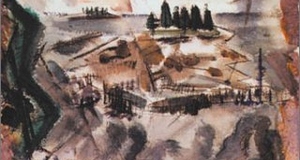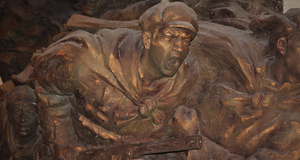Totalitarian Friendship: Carl Schmitt in Contemporary China
By
2020, Vol. 12 No. 07 | pg. 1/1
IN THIS ARTICLE
KEYWORDS
For the past several years, the study of German jurist Carl Schmitt has exploded in China. Floria Sapio remarks that Schmitt has enjoyed “enormous currency among mainland Chinese scholars since the 2000s.”1 Even though Schmitt has received a recent revitalization of interest of his thought among Western scholars,2 he is still known primarily for his aphoristic (and largely untranslated) texts on political theory and his infamous association with the Nazi Party. Yet, the reason that this esoteric and controversial thinker has garnered any consideration within Chinese academia is no mystery: Carl Schmitt was a political philosopher of illiberalism. He believed that liberalism had “a tendency to undermine a community's political existence” because a state founded on such an ideology “will lack the power to protect [citizens] from external enemies.”3 What is needed, Schmidt argued, is “a strong state… with the capacity to defend… ‘the unity of the state.’”4 While his argument in totum is more elaborate, it is Schmitt’s hostility to liberalism as embodied in Western political culture, governance, and ideology that has spurred interest in his work in China, for “[the Chinese] now feel… [that] liberal thought… doesn’t help them understand the dynamics of Chinese life today or offer a model for the future.”5 In Mark Lillia’s conversations with Chinese scholars and students, there is a pervasive desire “across the political spectrum… that China needs a stronger state, not a weaker one.”6 Liberalism has not provided an answer. Schmitt’s analysis on the crisis of liberalism is thus an ideological tool that helps not only legitimate current CCP one-party rule, but also an attempt to “ground new forms of Chinese political agency on an anti-Western value discourse…”7 Currently, Xi Jinping is trying to “revive communist ideology as a vibrant bulwark of China’s exceptionalism, to inculcate its citizens against Western democratic ideas.”8 While non-socialistic in orientation, Schmitt’s thought is quite similar to the Xi’s overall ideological aims. Thus, the reason that Schmitt’s political theories can help legitimise one-party rule “have ensured that China’s ‘Schmittian’ discourse has... [become] fashionable and profitable.”9 Schmitt’s relevance in China is not purely scholarly, but also socio- and geopolitical.The purpose of this paper is to examine how contemporary Chinese scholars have received and utilized Schmitt’s thought for legitimating CCP rule and for constructing an illiberal, anti-Western ideology. First, I will briefly describe Schmitt’s political thought and critique of liberalism. Second, I will review recent interpretations of his thought from Chinese scholars. Lastly, I will see a means in which Schmitt’s theories can be used in legitimizing CCP rule. The Political Thought of Carl SchmittThe three most relevant and influential aspects of Schmitt’s thought are his definition of the political (also known as the “friend/enemy distinction”), the state of exception, and the concept of homogeneity. Schmitt’s conception of politics is based in conflict. Schmitt saw all legitimate political and legal theories as ones that characterized “human beings as evil, their nature prone to conflict.”10 The conflict that initiates politics (or rather the political) is “the utmost degree of intensity of a union or seperation, of an association or dissociation.”11 In other words, it is in the distinguishment of the friend and enemy towards the state in its most pivotal moments, such as after the creation of the constitutional order or during a state of emergency that can plunge the state into chaos. The so-called “friend/enemy distinction” can be used against any individual member “within the state when antagonism reaches its highest intensity.”12 A friend is one who shares and partakes in the social and political way of life with the state, while an enemy, “post a threat to [the state’s] concrete physical existence.”13 Liberalism all but destroys the possibility of the friend enemy distinction, of politics at its most essential. Instead, it installs within the body politic a “neutrality [that] negates the existential intensity of the political.”14 Liberal ideology “substitutes a politically united nation with a ‘culturally interested public.’”15 To Schmitt, the alternative to the political, “depoliticized liberalism,”16 only infests the body politic with a pathology of singularity and individualism. In order for the protection of the constitutional order and political legitimacy of the state, Schmitt declares that the state must “require an individual to sacrifice his life to fight an enemy of the state… [and] cannot refuse to engage in battle.”17 The belief that individuals or groups can resist or be neutral in responding to state commands, leads to “the dreadful fate of the state in liberalism” whereby its internal plurality destroys its territorial and sovereign unity.18 The state of exception is one of Schmitt’s most lasting and controversial political concepts. Similar to the idea of “prerogative” in both Thomas Hobbes and John Locke,19 Schmitt sees that law is unable to adequately and fully defend the legal and political order from an extraordinary circumstance or crisis. In essence, law runs out. A sovereign is tasked to decide when law has run out and what means can be used to quell the crisis situation. Hence Schmitt’s famous dictum that “the sovereign is he who decides on the state of exception.”20 While in Schmitt’s text Political Theology, “the sovereign can be [any] person or institution, in a given polity, capable of bringing about a total suspension of the law and then to use extra-legal force to normalize the situation,”21 it is reasonable to conclude that Schmitt was truly thinking about the position of a dictator. Schupmann is clear that Schmitt “conceived of dictatorship as an institution bound to realize and defend the underlying political status of the political order” in moments of crisis.22 Thus, the sovereign dictator decides when a crisis arises and what measures must be done to eliminate the cause of that crisis and/or the crisis itself. Prioritizing law, the individual, or ethical and moral concepts in a political system (all inherent to a liberal polity, Schmitt decries) during a time of crisis will be the demise of the state. Schmitt states clearly that “the rule proves nothing; exception proves everything.”23 Therefore, the sovereign dictator is bound by no rules or beliefs that would limit his prime imperative of resolving an emergency. Building off the political and the state of exception, Schmitt see the homogeneity as an essential feature for the lasting order of the state. The jurist argues that there must be “a certain uniformity- a homogeneity… for a people to achieve its political existence in a state.”24 By “friends” of the political order, during moments of exception defined by the dictatorial sovereign, are “ready to defend the political project with their lives… this creates a total unity.”25 A state without homogeneity is a state made up of friends, enemies, and indifferent persons with “radically conflicting values… [all competing] for political power via the means of formal legality.”26 Thus, homogeneity is the status by which all citizens are friends to the state. When crisis arises again, the state is fully unified to utilize all productive and physical energies from the people for the purpose of defense of the nation and destruction of the enemy. Three Chinese InterpretationsWhile Liu Xiaofeng was Schmitt’s primary translator into Mandarin, three of the German philosopher’s most influential contemporary interpreters are literary theorist Zhang Xudong, and legal scholars Gao Quanxi and Qi Zheng. All three utilize Schmitt's political thought for differing political projects to help establish China and/or the CCP’s legitimacy, in and out of the Mainland. Zhang uses Schmitt for the construction of a new Chinese cultural policies, Gao for the maturation of political liberalism within China, and Qi for a theoretical basis for the transition to democracy. Zhang’s interpretation of Schmitt allows for China to be fully uncoupled from the colonial and inappropriate paradigm of Western universalistic liberalism. The theorist believes that it is impossible for China to construct an organic and particular cultural politics for China in “a [political] space delimited by Western universal values such as science, democracy, and liberty,”27 because Chinese cultural identity “often appears as an inferior mode [in Western discourse].”28 Zhang’s Chinese cultural politics is the reaffirmation of “Chinese subjectivity” which is “self-sufficient and not delimited by Western modernity.”29 The main content of this cultural politic is Schmittian homogeneity. To Zhang, Western values of market and political liberalism make “the genuine ideal of social equality in China… [impossible to] be realized.”30 This social equality occurs by aligning establishing and aligning a homogeneous character of the citizens in relation towards the state. Zhang concludes that only with the governing leadership of the Chinese Communist Party is China able to foster this egalitarian vision. First, because the political and ideological framework of the CCP is not affected by liberal thought. Second because Zhang, by mixing both the thought of Schmitt and Georg Lukacs, sees the CCP as “[representing] the interests of the whole proletariat… on the basis of its knowledge of society in its totality.”31 The CCP’s knowledge of society and vast state apparatus powers gives it the ability to, not only perform politics in the friend/enemy distinction, but more importantly “to forge the political will of the nation and… establish the state form of contemporary China.”32 Thus for Zhang, the counter-universalism based in the cultural subjectivity of China’s contextual existence must grounded in the authority and representation of the CCP. Without the party’s representation of the Chinese citizenry, either the scourge of liberalism or hierarchical authoritarianism would infect China’s unique and powerful political culture. With a similar goal of decoupling from the West, Gao Quanxi uses Schmittian concepts in order to foster a political maturation and reformation Chinese liberalism. It is strange that Gao uses Schmitt considering he is liberal who “envasages China’s future… based on liberal virtues.”33 One Schmittian scholar in fact sees Gao more as a critic to Schmitt’s overall political paradigm than an advocate.34 While it is true that Gao does have legitimate criticism with Schmitt, especially the latter’s relationship with fascism in his work and life, this has not stopped his engagement and utilization of Schmitt’s theories because a well-rounded political liberalism “should be able to reconcile seemingly contradictory elements of political thought.”35 Gao sees that contemporary China and Chinese liberalism in that the country is “being pressured to establish a liberal democratic constitutional state at a time when the ideal nation-state is increasingly being questioned.”36 China, to Gao, is thus in a transitional phase. It is not yet in liberalism and not completely out of authoritarianism, but the germination and ideological conceptions of liberalism are within public and political discourse. But this transition also puts China in a situation where it “simultaneously faces the demands of both exceptional and normal politics.”37 Gao identifies a critical weakness with liberalism in “its inability to handle exceptional [and transitional] politics.”38 To Gao, Modern Chinese liberalism as incredibly naive in that lacks an adequate understanding of this transition phase and China’s unique contextual political predicament. Chinese liberals and legal scholars thus must stop reading “well-worm (Anglo American) liberal theory that… is clearly inappropriate for China”39 and read Schmitt instead. Gao’s hope is that a reformed liberalism will be an “exceptional liberal politics”40 one that can deal with the transitional state and effectively articulate an appropriate understanding of nationalism, political agency, and constitutionalism within contemporary China. One cannot establish liberal system “without realizing that this first requires facing the realities of... [transitional] politics.41 To Gao, Schmitt provides the theoretical basis for contemporary political existence in China and a means to best conceptualize a road from the current transitional state towards liberal constitutionalism. Schmitt’s theories are thus the primary way by which China can actually achieve liberalism, even if that liberalism is “clearly at odds with the liberalism represented in the Chinese discourse of the late 1990s.”42 While Gao wants to mature liberalism so that it can grasp China’s contemporary political dynamics, Qi Zheng sees Schmitt’s theories as providing a basis for the transition towards a democratic state in China. Synthesizing Schmitt’s theories of the political, state of exception, and homogeneity, Qi theorizes that Schmitt’s political thought can be boiled down to “the political of transition, which refers to political activities related to a fundamental political rupture within the state.”43 This rupture contains two moments, “the founding and protecting moment.”44 The founding moment is when “a new political form is established” and the protecting moment being “when the new political order is under threat by an enemy.”45 To Qi, Schmitt views the founding moment being the creation of a state/constitution by a “political collectively that has a common political conscious of its political existence.”46 The protecting moment to Qi is an extreme variation state of emergency in Schmitt’s theory, a “radicalization of political tension and… the immediate possibility of disorder and political violence.”47 Whether a civil war or invasion by foreign forces hoping to reap the booty of a recently organized state, the protecting moment demands the fullest expression of power by the sovereign and friendship by the people. Based on this Schmittian framework, a transition to democracy for China is possible, but only in the form of “revolution by the people within the state.” Qi sees popular revolution as the most probable means for a transition to democracy, as it provides immediate popular legitimacy because of its bottom-up approach, as well as higher probability for occurance for it does not rely precondition of institutional collapse. The revolution is led by the political collectivity with a common conscious and through revolutionary violence and upheaval “form the political commitment and make the most fundamental political decision in the founding moment.”48 Peaceful or consensual means towards democracy do not establish the political friendship required for founding a new polity. Only through the process of determining the friend and enemy in the revolutionary stage, however brutal, is the founding moment successful. After the transition and founding moment is what Qi calls “ordinary democratic politics.” Qi makes certain throughout her text that Schmitt’s qualms with liberalism do not completely extend to democracy. She argues that democracy “is always based on the principle of making [friend/enemy] distinctions and forming homogeneity.”49 Schmittian Democracy is therefore a legitimating force for install homogeneity in that it provides a means for the “elimination or eradication of politically threatening heterogeneity” without consistently entering into the state of exception.50 Thus, democracy provides a political mechanism as a protecting moment. But, Qi makes clear that there will always be a time after the revolution that a protecting moment to keep the democratic order alive is necessary (ala the State of Exception). Thus a democratic China will not be liberal democratic China. It will be a strong state democracy that will not respect the rights of those who are indifferent or hostile to the state and require “individuals… to make the interest of the state a priority.”51 Qi’s Schmittian Democracy is thus weaponized democracy that utilizes all political and social instruments towards the unifying of the state. Whether it be a new revolutionary movement by the CCP or not, Schmittian democracy is a political force that Qi believes effectively legitimates whatever rule exists in China. Whether it be neocolonialism, liberalism, or democracy, the plurality of governing systems and structures that Schmitt’s ideas can justify is a testament to the active engagement with his thought in China. All of these particular utilizations demonstrate that Schmitt’s ideas are essential for many intellectuals in order to initiate a fundamental political reform or ideological reformulation in China. In one sense, this might point to a general dissatisfaction with the current CCP means of promoting their legitimacy. With Schmitt’s widespread intellectual capital in China, these unique interpretations of Schmitt can be catalysts for new widespread expressions of legitimacy and sovereignty adopted by the CCP or other Chinese political movements. Schmitt and the Chinese Communist PartyChina currently has a nationalistic youth and growing social discontent among the populace. For the past several years, the CCP regime has been fostering a nationalistic Confucian ideology, with elements of Marxism, based around the personality cult of Xi Jinping.52 But, in the face of declining economic growth, one wonders if this ideological hodgepodge will be enough if the current performance legitimacy of the regime is lost. Currently, Chinese youth see “the pursuit of national interest as the ultimate goal of international relations” which is a marked difference from “the uncritical internationalism of the late 1980’s [youth].”53 While the CCP has put forward a number of “state initiatives” such as continual curriculum reform or creating “hip” online websites that glorify the Chinese president, these seem misguided attempts that do not fully address the problems of youth frustration and future regime legitimacy. Compounded with social unrest over youth unemployment, violent protests (or rather violent responses to protects), nihilistic materialism, and crime, the CCP needs a ideology that can foster legitimacy with or without a performative-economic aspect. As Carl Minzner argues, Beijing’s weak “efforts to respond to outbursts of popular anger are steadily undermining China’s institutions and norms.”54 Schmitt's political theory can be tools that the CCP can utilize to redirect youth nationalistic aggression and social frustration to the will of the party. The CCP would merely make the friend/enemy distinction on dissidents, ethnic minorities, or those indifferent to CCP rule. By entering the state of exception, as arbitrarily decided by Xi and/or the CCP, China can rally nationalistic youths on the promise of national glorification with the elimination of enemies and the initiation of homogeneity. Once the enemy is eliminated, or silenced into fearful submission, homogeneity of political will around the CCP is complete. In no way could the CCP lose legitimacy but at any opportunity of dissent or indifference, the sovereign can declare exception and the threat of heterogeneity is eliminated. The differentiation can also provide Chinese youth a firm belief, not in materialism or vague Post-Maoist socialism, but in the continual unity of the state around the totalizing representative will of the CCP. As Schmitt makes clear, “The value of life stems not from reasoning; it emerges in a state of [emergency] where men inspired by myths to do battle.”55 The consistent conflict and full utilization of all peoples towards the elimination of the enemy provides the CCP a means for lasting legitimacy. While it may be argued that the current CCP desires peace rather than consistent conflict, there are two ways to have a peaceful Schmittian legitimacy. First, the state of exception need not be a holistic moment, but individualized events whereby the enemy is precisely located and eliminated. With the vast technological apparatus that the CCP possesses, the state of exception can be pinpointed to a single online post. Not one hour may pass without the elimination of the enemy with the Sovereign using whatever extra-legal means it thinks is necessary. Second, there is already a great amount of anger, hostility, and conflict happening in Chinese society everyday, whether it be protests that end in police brutality or delusional men trying to massacre schoolchildren with a knives. The political gives citizens an opportunity to unleash aggression, not at the state or schoolchildren, but against those who wish to destroy their political (and possibly sociocultural) way of life. There is thus peace for the friends of the CCP, those who matter. Unlike the Cultural Revolution, which promoted bottom-up aggression as a means toward dismantling the capitalist road bureaucracy that had betrayed the Maoist vision, the Schmittian approach is a top-down revolution of everyday life aimed at the complete harmonization of the state towards the will of the party. The Schmittian solution(s) to the Chinese problem of legitimacy, be it from Chinese scholars themselves or the above hypothetical, are quite distasteful to western, liberal democratic ears. Schmitt’s theories, in many context, can sound like the worst justifications for fascism, postcolonial nationalism, and arbitrary dictatorial violence. But to millions of Chinese, Schmitt’s ideas are highly persuasive to more people in China everyday. Schmitt is “at the center of intellectual debate… being read by everyone, whatever their partisan leanings.”56 Without understanding the means by which Schmitt is used and can be used by Chinese citizens, lawyers, and intellectuals, scholars of China are not able to possess a full picture of the contemporary ideological landscape. As liberal democracy slowly loses its hegemonic grip on political expression in the developed world, Schmitt’s ideas and reception, in and out of China, become more relevant than ever before. ReferencesBluhm, Harold. "Three Strategies for Criticizing Liberalism and Their Continued Relevance." Carl Schmitt and Leo Strauss in the Chinese-Speaking World, edited by Kai Marchel and Carl K.Y. Shaw, Lexington Books, 2017, pp. 17-36. Hobbes, Thomas. Leviathan. Penguin Books, 1987. Kroll, Charlotte. "Reading the Temperature Curve: Sinophone Schmitt-fever in Context and Perspective." Carl Schmitt and Leo Strauss in the Chinese-Speaking World, edited by Kai Marchel and Carl K.Y. Shaw, Lexington Books, 2017, pp. 103-19. Lilla, Mark. "Reading Strauss in Beijing." The New Republic, 16 Dec. 2018, newrepublic.com/article/79747/reading-leo-strauss-in-beijing-china-marx. Accessed 10 Nov. 2018. Lind, Michael. "Carl Schmitt’s War on Liberalism." The National Interest, 23 Apr. 2015, nationalinterest.org/feature/carl-schmitt%E2%80%99s-war-liberalism-12704?page=0%2C2. Accessed 10 Nov. 2018. Locke, John. "The Second Treatise on Government." The Second Treatise of Government and A Letter Concerning Toleration, edited by Tom Crawford, Dover Publications, 2002, pp. 1-112. Lukacs, Georg. Lenin: A Study in the Unity of His Thought. Translated by Nicholas Jacobs. New Left Books, 1977. MacFarquhar, Roderick. "Does Mao Still Matter." The China Questions: Critical Insights into a Rising Power, edited by Jennifer Rudolph and Michael Szonyi, Harvard University Press, 2018, pp. 26-32. Minzner, Carl. End of an Era: How China's Authoritarian Revival is Undermining Its Rise. Oxford University Press, 2018. Qi, Zhang. Carl Schmitt, Mao Zedong, and the Politics of Transition. Palgrave Macmillan, 2016. Rosen, Stanley. "Chinese Youth and State-Society Relations." Chinese Politics: State, Society and the Market, edited by Peter Gries and Stanley Rosen, Routledge, 2010, pp. 160-78. Sapio, Floria. "Carl Schmitt in China." The China Story, Australian Centre on China and the World, 7 Oct. 2015, www.thechinastory.org/2015/10/carl-schmitt-in-china/. Accessed 10 Nov. 2018. Schmitt, Carl. The Concept of the Political. Translated by George Schwab., University of Chicago Press, 1996. --. “The Liberal Rule of Law.” Weimar: A Jurisprudence of Crisis, edited by Arthur J. Jacobson and Bernhard Schlink. Translated by Belinda Cooper. University of California Press, 2000, pp. 294-299. --. Political Theology: Four Chapters on the Concept of Sovereignty. Translated by George Schwab., University of Chicago Press, 1985. Schupmann, Benjamin A. Carl Schmitt's State and Constitutional Theory. Oxford University Press, 2017. Shaw, Carl K.Y. "Toward a Radical Critique of Liberalism: Carl Schmitt and Leo Strauss in Contemporary Chinese Discourses." Carl Schmitt and Leo Strauss in the Chinese-Speaking World, edited by Kai Marchel and Carl K.Y. Shaw, Lexington Books, 2017, pp. 37-57. Vinx, Lars, "Carl Schmitt", The Stanford Encyclopedia of Philosophy (Spring 2016 Edition), Edward N. Zalta (ed.). https://plato.stanford.edu/archives/spr2016/entries/schmitt/ Endnotes1.) Sapio, "Carl Schmitt in China." 2.) The interest is expressed in a variety of different academic and politics contexts, “Schmitt’s reputation as a major thinker endures, sometimes in surprising quarters. American law professors wrestle with Schmitt’s theories about constitutionalism and power, while the Western Left is impressed by his denunciation of liberal globalism as a mask for Anglo-American and capitalist imperialism.” Lind, “Carl Schmitt’s War on Liberalism.” 3.) Vinx, "Carl Schmitt" 4.) Qi, p. 20. 5.) Lilla, "Reading Strauss in Beijing." 6.) Ibid. 7.) Marchal and Shaw, p. 10. 8.) MacFarquhar, “Does Mao Still Matter?” p. 30. 9.) Sapio, "Carl Schmitt in China." 10.) Bluhm, p. 26. 11.) Schmitt, The Concept of the Political, p. 26. 12.) Qi, p. 75. 13.) Ibid, p 76. 14.) Shaw, 41. 15.) Ibid. 16.) Schmitt contends that there is no true “liberal politics” but only a liberal critique of politics. Schmitt, The Concept of the Political, p. 70. 17.) Qi, p. 65. 18.) Ibid. 19.) Hobbes, Leviathan, p. 232-233. Locke, Second Treatise on Government, p. 74-78. 20.) Vinx, "Carl Schmitt" 21.) Ibid. 22.) Schupmann, Carl Schmitt’s State and Constitutional Theory, p. 153. 23.) Schmitt, Political Theology, p. 15. Yet, The sovereign “cannot change the fundamental political decision in the [constitution]” because, according to Schmitt’s theory on the constitution-making powers of the people, “only the… people have the power and political will to change the fundamental political decision.” Qi, p. 3 24.) Schmitt, “The Liberal Rule of Law,” p. 297. 25.) Qi, p. 79. 26.) Ibid, p. 81. 27.) Shaw, p. 44. 28.) Ibid. 29.) Ibid p. 46. 30.) Ibid. 31.) Lukacs, 1977, p. 34. 32.) Quote from Shaw, p. 46. 33.) Kroll, p. 115 34.) Qi, p. 14. 35.) Kroll, p. 115 36.) Ibid. 37.) Ibid, p. 116. 38.) Ibid. 39.) Ibid. 40.) Quote from Ibid, p.117 41.) Ibid, p. 116. 42.) Ibid, p. 117. 43.) Qi, p. 2. 44.) Ibid, p. 3 45.) Qi, p. 3 46.) Ibid, p. 2. 47.) Ibid, p. 3. 48.) Ibid, pp. 134-5. 49.) Ibid, p. 85. 50.) Ibid. 51.) Ibid, p. 135. 52.) Minzner, p. 138. 53.) Rosen, p.161. 54.) Minzner, p. 95 55.) Lind, “Carl Schmitt’s War on Liberalism.” 56.) Lilla, "Reading Strauss in Beijing." Suggested Reading from Inquiries Journal
Inquiries Journal provides undergraduate and graduate students around the world a platform for the wide dissemination of academic work over a range of core disciplines. Representing the work of students from hundreds of institutions around the globe, Inquiries Journal's large database of academic articles is completely free. Learn more | Blog | Submit Latest in Law & Justice |


















